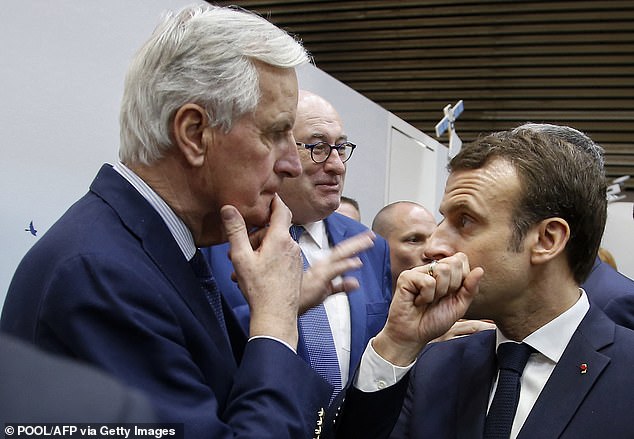Brexit negotiator Michel Barnier is named French PM despite not being a serving elected MP… and now faces immediate vote of no-confidence amid fury over Macron’s appointment
Former Brexit negotiator Michel Barnier was announced today as France’s new prime minister, almost two months after France’s snap elections ended in political deadlock.
The 73-year-old now faces the mammoth task of forming a government that can withstand a National Assembly divided into three major political blocs, with no single bloc able to form a clear majority.
Following the recent political stalemate, President Emmanuel Macron has called on Mr Barnier to take on this prized role, despite the fact that he is not a sitting elected member of parliament.
The Brexit hardliner now faces an immediate vote of no confidence due to his lack of democratic legitimacy.
An official at Matignon, the prime minister’s official residence in Paris, said on Thursday afternoon: “Michel Barnier has been appointed prime minister by President Macron.”
With this appointment, Barnier becomes the oldest prime minister in the history of the Fifth Republic. He succeeds the youngest prime minister, Gabriel Attal, who is 35 years old.
Michel Barnier, 73, was announced today as France’s new prime minister

Barnier pictured with Emmanuel Macron at the Elysee Palace in Paris, on January 31, 2020, a few hours before Britain officially left the European Union
Since the announcement, Macron appears to be counting on the far-right Rassemblement National of three-time presidential candidate Marine Le Pen not to block Barnier’s appointment.
RN party leader Jordan Bardella said Barnier would be judged “on the basis of evidence” when he addressed parliament.
Greens leader Marine Tondelier responded: ‘We know in the end who decides. Her name is Marine Le Pen. She is the one to whom Macron has decided to submit.’
Barnier was last in parliament in 1993 and is currently a member of the Republicans (LR) party, the current name for the Gaullist conservatives, who are in opposition.
Pressure is mounting on President Macron to appoint a prime minister after a coalition led by his Renaissance party finished second in snap elections in early July.
The victory was achieved by the Popular Front, a left-wing coalition specifically aimed at preventing the far-right Rassemblement National party from coming to power.
Barnier was not seen in the Élysée until Thursday, when he emerged as a serious candidate for a new French government.
He attempted to become LR’s presidential candidate in 2022, but was eliminated in the first round of the party elections with less than five percent of the vote.
During the campaign, he took a tough stance on immigration, saying it was “out of control.”
France faces a deadline to begin 2025 budget talks as it faces heavy criticism from the EU for overspending.
On Thursday, Rassemblement National MP Jean-Philippe Tanguy said Barnier represented the “petrified old world” and accused the Élysée of “heading towards Jurassic Park”.
Barnier first became a member of the French parliament in the 1970s at the age of 27 and first joined the government under the late President Jacques Chirac in the mid-1990s.
Barnier has had such a long political career at the highest level that he has been called by some the ‘French Joe Biden’, after the American leader whose long career has lasted approximately the same length.
The Brexit hardliner who British Prime Minister Boris Johnson once described as a “bulldozer” led the EU’s talks with Britain on leaving the union from 2016 to 2021.

Barnier has been named France’s new prime minister, the Elysee Palace announced on September 5, nearly two months after parliamentary elections left the country in a political deadlock. Pictured: Barnier and Macron at the 56th International Agricultural Show (Salon international de l’Agriculture) at the Porte de Versailles exhibition center in Paris on February 23, 2019
He served as a minister four times and European Commissioner twice before becoming head of the Brexit taskforce in 2016.
Barnier wrote a book about Brexit, ‘My Secret Brexit Diary: A Glorious Illusion’. The title already clearly expresses what he thinks about the idea of the United Kingdom leaving the European Union.
Although Barnier remained true to his reputation for politeness, avoiding any salacious gossip in his published work, he continues to be amazed by the way his British colleagues handled the trial.
“There is absolutely something wrong with the British system… every day that goes by shows that they do not realise the real implications of what is at stake here,” he wrote.
Barnier, who failed to emerge from the primaries to become the conservative presidential candidate in 2021, is also said to have views on domestic politics that are more in line with the far right.
He provoked a storm of indignation when he said that France should regain its “legal sovereignty” and not be subject to the rulings of the Court of Justice of the European Union and the European Court of Human Rights.
He also caused outrage in Brussels by calling for France to break away from the supervision of the European Court.
To regain France’s “room for manoeuvre”, Barnier said that if elected he would hold a referendum asking voters to approve constitutional changes giving parliament the power to set annual immigrant quotas.
He stated that he “doesn’t really like” the concept of European sovereignty and criticised “German dominance” in the European Union, adding: “I know what I’m talking about.”
His appointment has even caused concern among allies, with a LR MP, who asked not to be named, saying he “embodies everything the French don’t want.”
He is “disconnected and will continue to kill or finish the right,” they said.
In July, Macron refused to appoint the alliance’s candidate for prime minister, 37-year-old civil servant Lucie Castets, saying she was unable to govern stably.
